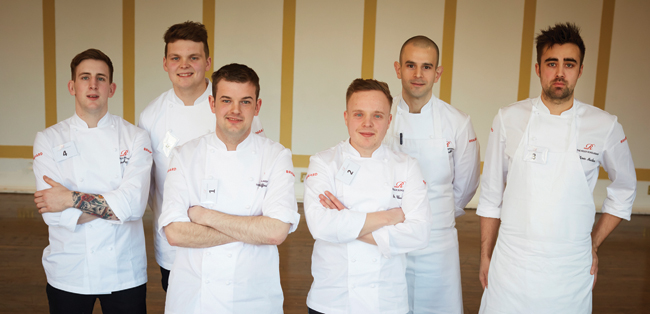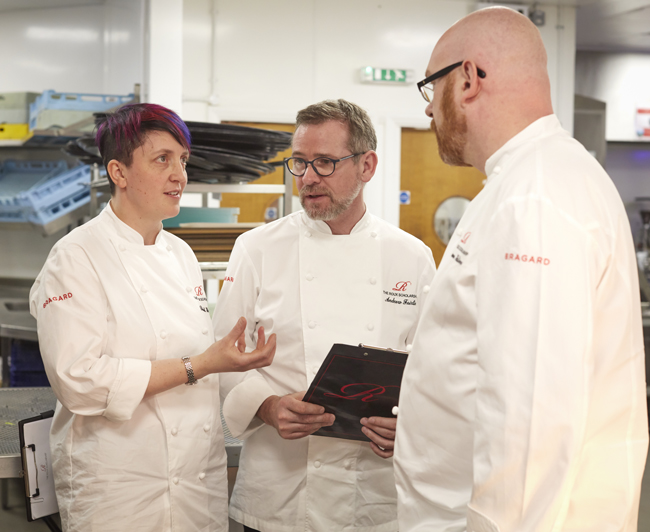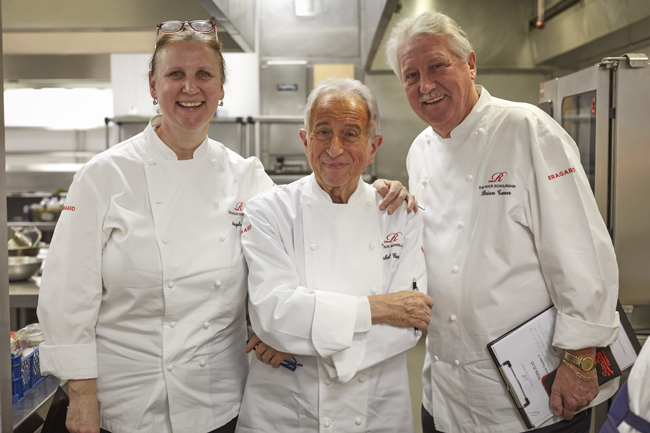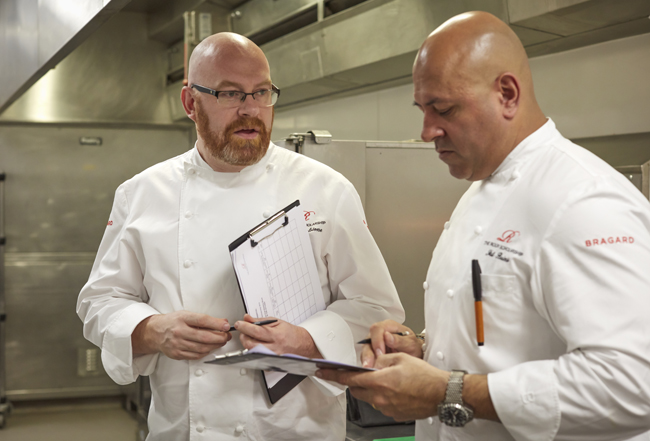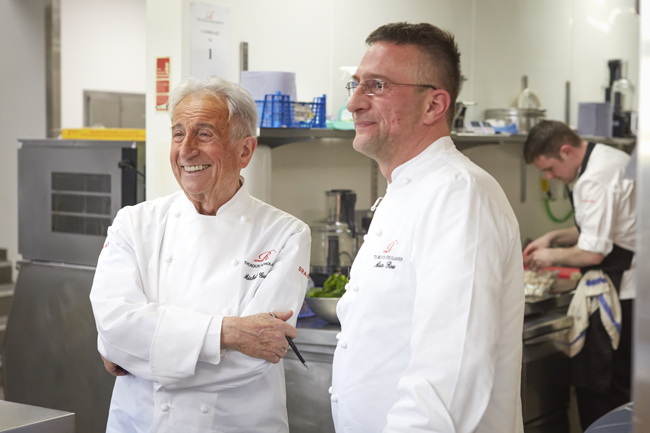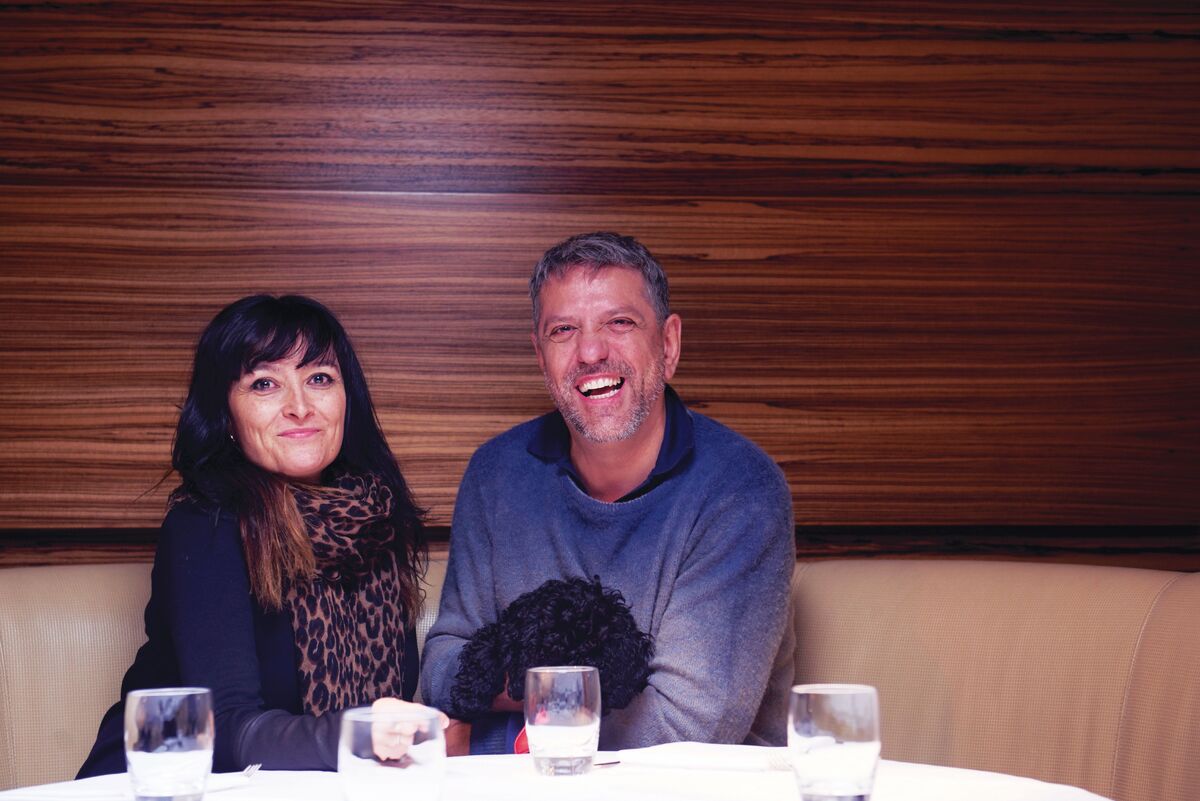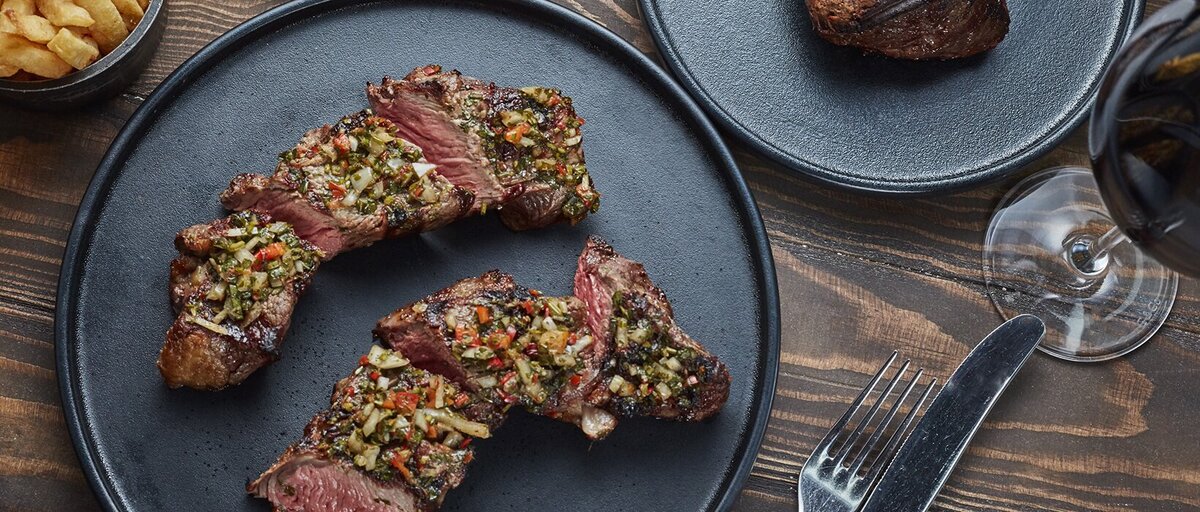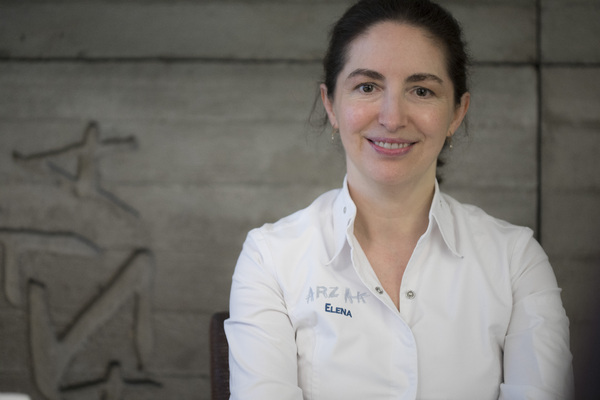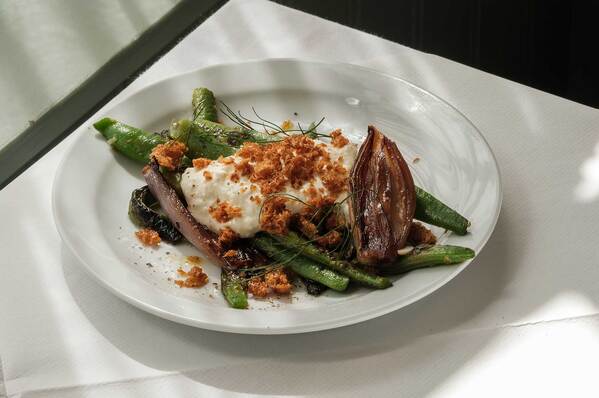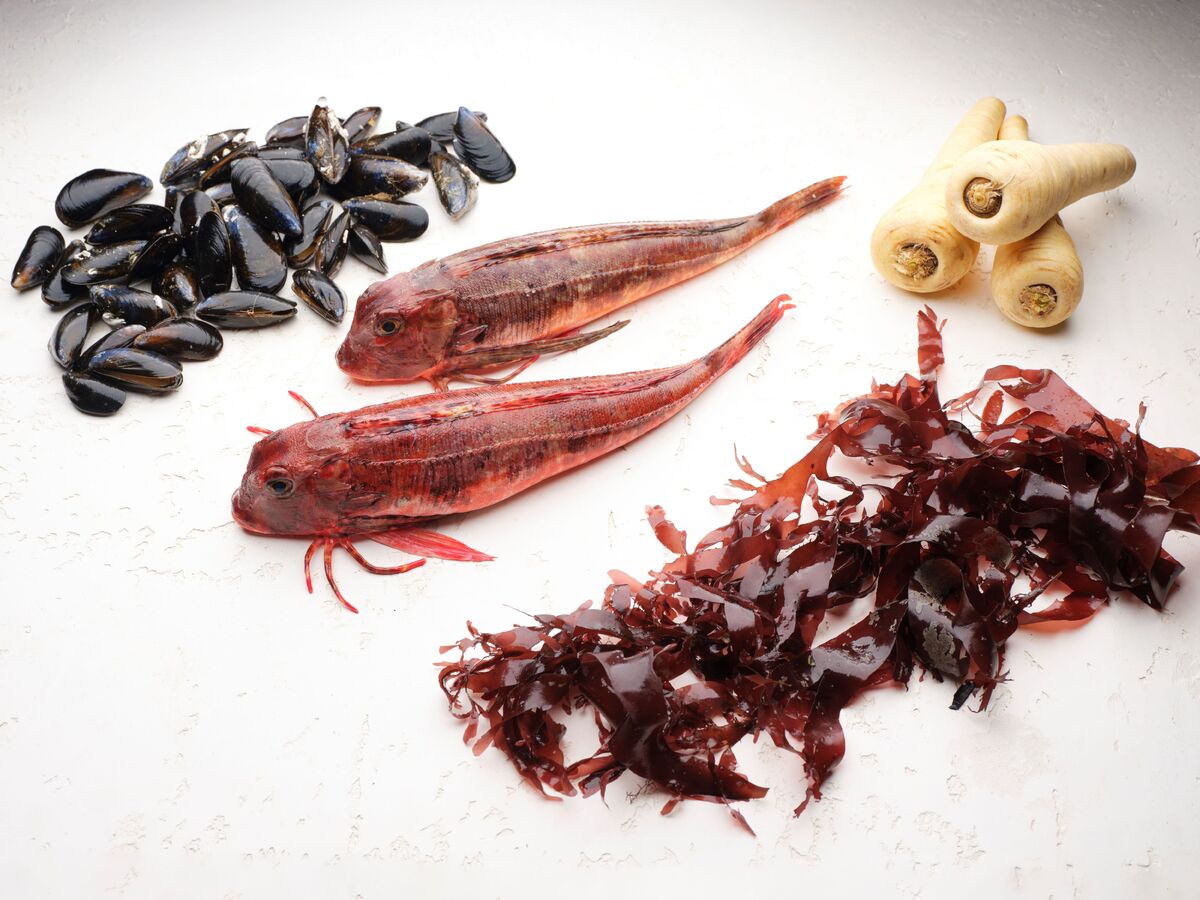A dream come Roux: Full report from the Roux Scholarship 2018
A three-month stint in a three-Michelin-starred restaurant anywhere in the world awaits the winner of the 2018 Roux Scholarship. Fiona Sims joins the judges as they select the 35th scholar
Six desks, six chefs, and a copy of Auguste Escoffier's Le Guide Culinaire (the Cracknell and Kaufmann translation) on each. It's there to help the finalists prepare for the Roux Scholarship, now in its 35th year and held at London's Westminster Kingsway College.
The finalists also have well-thumbed copies of Michel Roux's Pastry, and most have a copy of Larousse Gastronomique. Their battery of cookery classics are needed today if they are to make the most of the short time allowed to prep for the Escoffier-inspired recipe.
The chefs, who are all under 30 years old, will have just three hours to cook in front of 10 judges. The chefs are Ben Champkin from L'Enclume in Cumbria, competing in the final for the second time, and his colleague, Sam Nash, plus Oliver Marlow from Roganic, Fergus Wilford from Cliveden, Ryan Porter from Northcote and third-time finalist Martin Carabott from soon-to-open London venture Hide.
You can hear a pin drop as Michel Roux Jr pauses before announcing the dish they are about to cook: pigeonneaux Valenciennes style, vin jaune sauce. Translation: whole roasted pigeons stuffed with a forcemeat and sweetbreads, garnished with spinach and carrots, served with glazed polenta and morel timbales, accompanied with a vin jaune sauce.
Not only have the chefs got to contend with the frankly terrifying panel of judges, but there are three TV crews in the room this year, including ITV News and a documentary maker.
Finally, theyâre off. Most finalists get their polenta on first and then begin preparing the ingredients for their farce, before beginning the lengthy, fiddly task of de-boning the small birds.
âI want to see those pigeon bones in that stock,â whispers Bains as he looks on. âIâm also interested to see how many will hold a little bit of the wine back to refresh the sauce at the end, to give it that distinctive vin jaune flavour,â he explains.
Vin jaune is the vinous pride of the Jura region of France. Itâs waxy and palate-coating, with powerful flavours that saturate your senses, thanks to the Savagnin grape variety, special terroir and distinctive winemaking method.
âVin jaune sauce is great with poultry,â says Turner, who has been judging the competition for an impressive 31 years. Has he seen an elevation or a decline in skills over this period? âThatâs a good question, and I would say that 30 years ago, these guys, at the ages they are, and the level they are, would not have been able to do these tasks. Chefs these days are learning these skills at a much younger age â"itâs satisfying to watch. They are under immense pressure â" just look at the people in this room, from the judges to the TV cameras â" yet they are remaining calm.â
Hartnett agrees. âThereâs a very good skill level here today. Thatâs what is brilliant about this competition â" it showcases these skills,â she says. This is the fourth year Hartnett has judged the scholarship and she says she is always impressed with the kit that each competitor chooses to bring. âThereâs nothing fancy. Itâs just simple tools for proper cooking.â She reveals that she makes a similar dish every Christmas with a capon, stuffing it with forcemeat laced with black truffles.
âItâs brilliant to see chefs challenged in classical cooking techniques,â observes Smyth, a first-time judge. âThe standard at the semi-final was excellent â" some of them really stood out â" but the final is a whole different thing. They most probably have never tasted this dish before, let alone seen what it looks like â" in fact, Iâd quite like to have a go!â grins Smyth.
âThe brief is to de-bone, stuff and reform the pigeon, but some are taking all the bones off and the legs,â observes Humphrey, who is also making her first appearance as a judge. âI would leave as much on as possible, as if you donât, you run the risk of the farce spilling out when itâs cooked. Most of them wonât have tasted vin jaune either â" itâs not just any old white wine. But ultimately, they need to make a good sauce with it and enough of it to serve four generously,â she advises.
âEntering this competition is a massive opportunity for everyone and reaching the final is another level â" it opens so many doors. When you see the winners, the past scholars, it just inspires you to do better. If I didnât work for Michel, I would definitely have entered when I was younger,â admits Humphrey, who has worked at Le Gavroche for 22 years.
Hulstone, who is relishing his third year as a judge, is continually pacing the room, scrutinising the finalistsâ de-boning techniques. âSome have cut right down the back bone, and a couple have cut through the skin â" if you do that thereâs nothing to hold in that farce,â observes Hulstone. âBut weâve got six very good finalists here with fantastic backgrounds. Itâs one of the strongest finals Iâve been to in a long time.â
Head scholar and judge Andrew Fairlie agrees: âI think itâs the strongest final weâve had yet. Every single one of them is capable of winning this â" and they know it. One of them will be elated and five will be gutted, but theyâre all meant to be here.â
When Fairlie won the competition, he chose Guérardâs three-Michelin-starred Les Prés dâEugénie in Aquitaine as his three-month placement and went on to work there for an additional three months. âThey were very kind to me. In fact, if I had to choose my last meal on earth, it would be at Les Prés dâEugénie. Itâs very important for the scholars to choose the right place to go,â he says.
Guérard, meanwhile, is prowling around the kitchen, peering into stockpots and sniffing. So whatâs his view of the prestigious competition? âI love it because it brings people that I hold in such high esteem together. Thereâs so much enthusiasm and plenty of professionalism. It always irritates me when I hear people say that manual work is worthless. A pianist is a manual worker; so is a surgeon,â he shrugs.
Michel Roux Jr points out that the finalists are dealing with added scrutiny this year. âWeâre looking a lot more at how they are working, from their method through to their wastage. Weâre even going through their bins.â
So just how long does it take Alain and Michel to decide on the dish for the final? âQuite a few months, actually. We decide on the kind of ingredients we want the competitors to work with and then we take it from there. We want to make it interesting for them â" not impossible, but a challenge â" and we want them to learn something,â says Alain, before disappearing to judge the first completed dish.
And that evening at the Langham London, at a ceremony attended by the great and good in hospitality, it was a visibly exhausted Carabott who stepped forward to take the prize.
The prize
In addition to the three-month scholarship at a three-Michelin-starred restaurant anywhere in the world, Martin Carabott also wins a bounty of prizes, including £6,000 to support his career development, a trip for two to the wine cellars of Laurent-Perrier in France, two nights and dinner at the Seafood Restaurant in Padstow, Cornwall, and a collection of Global knives.
The judgesâ verdict on the pigeon dish
Clare Smyth
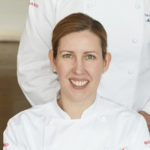
Simon Hulstone

Brian Turner
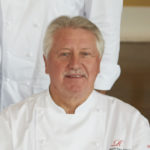
Michel Roux Jr

The judgesâ verdict on the winner

âWhat we liked about Martin was not only his skills, but his control and organisation in the kitchen. He worked well with his commis and was meticulous in his methods. His perseverance in competing in the scholarship finally paid off with his third attempt in what I would say was one of the strongest finals in a long time.â
Andrew Fairlie
 âFrom the word go Martin was ready this year. I could tell that even before we gave him the recipe â" nothing was going to faze him. His set-up, his method of work, his organisation, his instruction to his commis and his calmness under pressure â" he was match-fit this year. He wanted this prize more than anyone else. He is a very humble character with a tremendous work ethic, and in my opinion he is the perfect Roux scholar. Itâs great to have him join the already strong list of the UKâs finest chefs.â
âFrom the word go Martin was ready this year. I could tell that even before we gave him the recipe â" nothing was going to faze him. His set-up, his method of work, his organisation, his instruction to his commis and his calmness under pressure â" he was match-fit this year. He wanted this prize more than anyone else. He is a very humble character with a tremendous work ethic, and in my opinion he is the perfect Roux scholar. Itâs great to have him join the already strong list of the UKâs finest chefs.â
Sat Bains
 âMartin stood out because of his mental attitude in the regional and the final. Great skills, prep work, cooking ability, cleanliness and discipline. He is someone I would employ at Restaurant Sat Bains.â
âMartin stood out because of his mental attitude in the regional and the final. Great skills, prep work, cooking ability, cleanliness and discipline. He is someone I would employ at Restaurant Sat Bains.â
Angela Hartnett
âMartin worked so well. Heâs so professional, so clean, so tidy and so organised, but most importantly, he created a great dish â" a delicious sauce, with the pigeons cooked well and a good farce.â
Brian Turner

Martin Carabott, Roux Scholarship 2018 winner
Lucky old Ollie Dabbous. The top London chef hasnât just got one Roux scholar working for him, he now has two.
As well as last yearâs winner, Luke Selby, who heads up the fine-dining restaurant at Dabbousâs new Piccadilly venture, Hide, he has Malta-born Martin Carabott, one of two senior sous chefs at the 64-seater Below, the bar in Dabbousâs smart new venture opening later this month in partnership with Hedonism Wines.
Having succeeded in the final at his third attempt, Carabott, 29, says: âThis time I was ready to expect the unexpected. Thereâs always something youâve never done before or not done very often. I had practiced de-boning, but only on one bird, never four pigeons at once. But I held it together and just got on with it.â
Carabott admits that the win hasnât sunk in yet. âItâs probably because I had to go straight back to work. But I am very aware of the effect it will have on my career, and of the exposure it will give me. But now I have the responsibility of representing the Roux family, and of giving it my best to be a good ambassador. They have put a lot of faith in me, so itâs up to me now to uphold that,â he says.
Carabott always knew he wanted to be a chef, choosing a cooking diploma at his Maltese college at 16 years old. âMy parents, who are both in medicine, always encouraged us to do what we wanted â" they built me into what I am today,â he credits, cutely.
As part of his college course he could spend an internship abroad â" he chose Gleneagles in Scotland, returning to work at Restaurant Andrew Fairlie after he graduated. âIt opened my eyes to what a Michelin-starred restaurant is all about, and the attention to detail needed in the food,â he remembers.
Later, he moved to London to work for three-Michelin-starred, Rome-based chef Heinz Beck at his then Lanesborough hotel restaurant, and then on to the Royal Automobile Club, where he stayed for four years in its fine-dining restaurant, working his way up to senior sous chef. Next, he joined the Clove Clubâs Isaac McHale on the opening of Luca, and a year later he was approached by Dabbous.
âIâd like to own my own restaurant one day, or something close to it,â he reveals of his future plans. Is returning to Malta an option? âAt the moment, no, but that might change. The food scene there keeps on getting better every time I go back.â
Carabott does not yet know which three-Michelin-starred restaurant he will undertake his scholarship, but he has a few ideas, ranging from Saison in San Francisco to Gaggan in Bangkok. Watch out world, Carabott is coming.

Photography by Jodi Hinds



